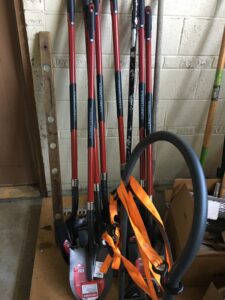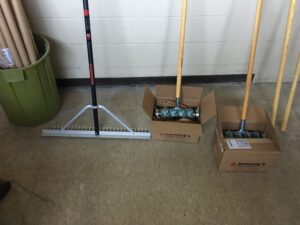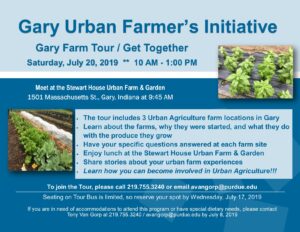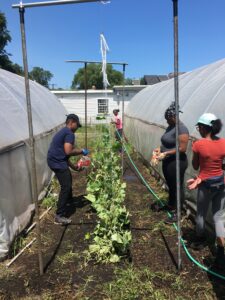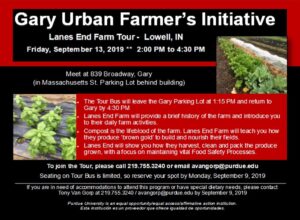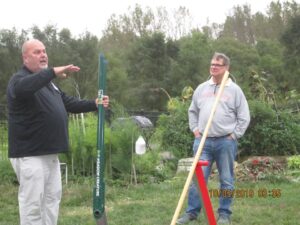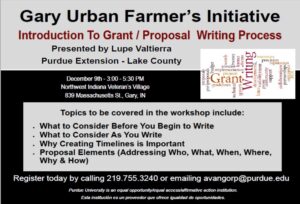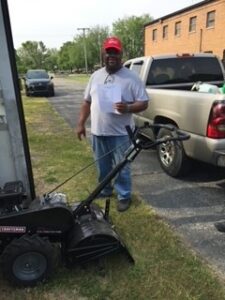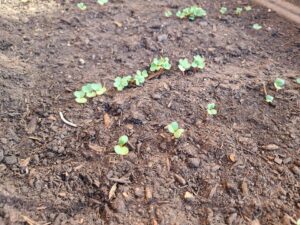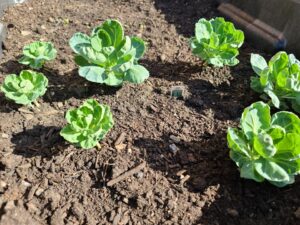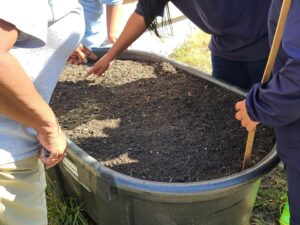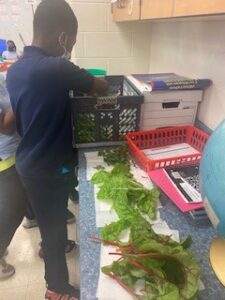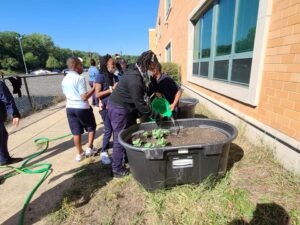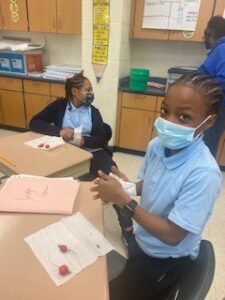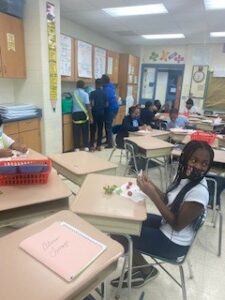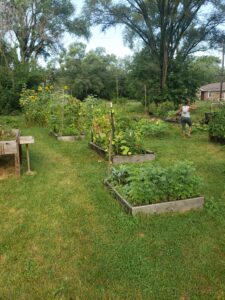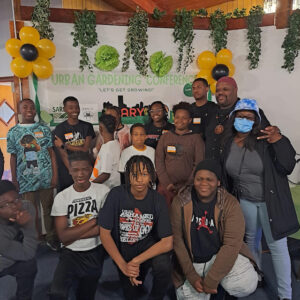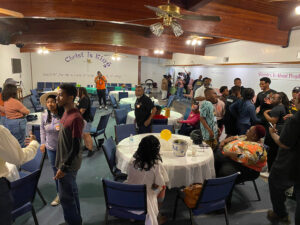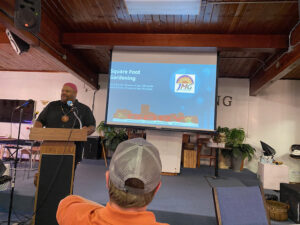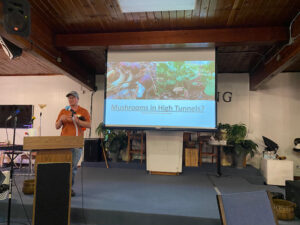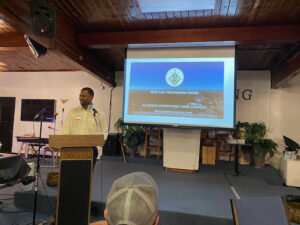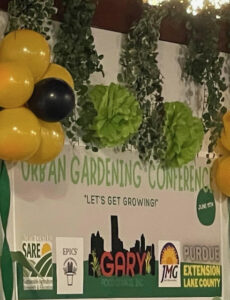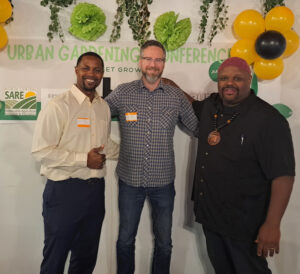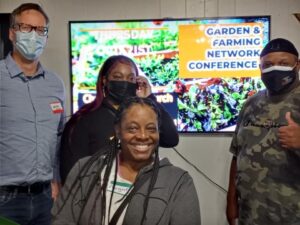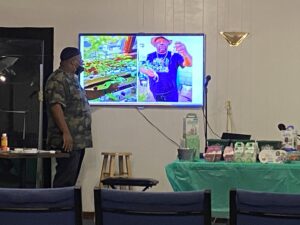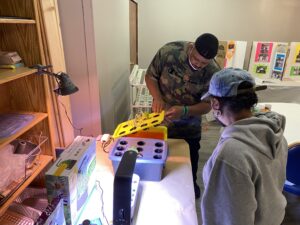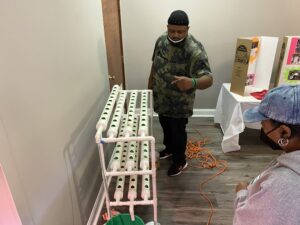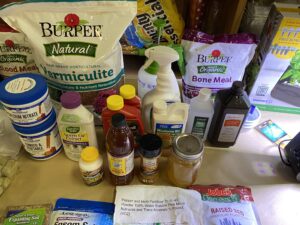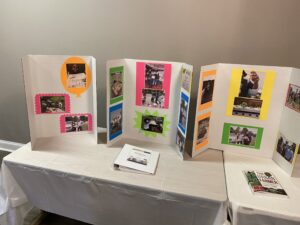Final report for LNC18-399
Project Information
Increasing the Sustainable Production and Access of Fresh Produce in Urban Areas of NW Indiana
The act of growing and increasing the availability of fresh produce in an urban setting has recently become an important issue. As large grocery stores have moved out of urban areas, fresh produce availability has become more challenging and many vacant lots left behind are viewed as potential food production sites. As a result, urban agriculture has increased in importance due to the impacts on accessibility and affordability of fresh produce, the local population's health, food equity, economic development, and job creation. In many urban communities, particularly densely populated neighborhoods, there is an increasing demand for sustainable fresh produce that is more accessible. Although there is mounting pressure for urban farmers to produce more food, there is a general lack of scientifically based information on the most efficient and effective ways to meet this demand. As such, there is a gaping need to train urban farmers in sustainable agriculture practices, form peer-topeer networks to share newly acquired knowledge and build marketing capacity within urban neighborhoods throughout the US to be able to produce and sell the fruits and vegetables that are needed.
In the city of Gary, in Northwest Indiana, a multi-stakeholder group, The Gary Food Council, was recently formed to focus on how the local food supply chain must function sustainably to increase access to fresh food for the city population. Within the city, there are only four large grocery stores that sell fresh produce for more than 75,000 people. In order to viably produce enough fresh fruits and vegetables in this urban area, it is important to provide programs to their urban farmers that allow them to gain the skills needed to be successful. This project will evaluate experiential learning activities to determine how effective they are for increasing production and knowledge gained by urban farmers in Gary. Activities include support for an urban agriculture certificate program, a tool sharing initiative for small-scale diversified farmers, the formation of a peer-to-peer networking group, and the development of a validated internship program with trained mentors. Trained urban farmers will also be linked with consumers to sell their local produce through community stores, markets, grocers, restaurants, institutions, and food banks. By working on both the supply and demand sides of the equation, urban farmers will be able to sustainably produce and market their fresh produce.
The overall purpose is to evaluate experiential learning activities created to support urban farmers be successful at growing fresh produce in Northwest Indiana. Specifically, we will measure 1) knowledge, skills, and behavior gained by participants to create improved farming systems, 2) retention and utilization of knowledge and skills that improve efficiency, 3) influence of attitudes and engagement of peer to peer network on innovation on small-scale farming systems, 4) knowledge and skills gained by network participants to transform knowledge and innovation, 5) collaboration and engagement to develop the internship program, 6) knowledge, skills, and engagement of tool sharing program.
In Indiana as well as across the country, urban agriculture is flourishing. A source of food production in the urban setting is helping to meet growing demand for local food, which has been increasing at all points in the supply chain, including direct consumer linkages up through institutional levels. In addition to producing food, urban agriculture generates many other sustainable benefits which include:
- improving food access to food insecure areas;
- increasing fruit and vegetable consumption and more healthful food consumption overall;
- reducing blight in neighborhoods;
- catalyzing youth development opportunities;
- creating job and training opportunities;
- and incubating small business endeavors among many other benefits
The City of Gary, located in Lake County in the Northwest corner of Indiana, is a prime example of an urban area that is striving to utilize urban farming as a means to tackle many challenging social, environmental, and economic issues. The median income in Gary is $28,895, a little more than half of the median income found in the rest of Lake County ($50,905). There are only four grocery stores that sell fresh produce for the 76,424 people living in the city. There is no major chain grocer within the community and the limited food outlets are predominantly convenience stores and fast food chains. Residents must travel by personal vehicles or rely on public transit to commute miles outside Gary to purchase groceries. Although there is demand for fresh fruits and vegetables and seemingly space for urban farming to occur, there are currently less than ten urban farms functioning in the city. Lack of educational opportunities, hands-on experiences, and urban farmer networking have all been listed as programs that need to be developed in the community to increase production. One of the city’s greatest challenges is access to fresh healthy food for local residents. As such, one of their goals has focused on increasing urban farmers’ capacities to maximize fresh fruits and vegetable production. Within its economic and urban revitalization strategy, Gary has the potential to produce local foods to support the community, but there is a need to establish urban agriculture programs that will help this sector grow effectively in order to engage everyone.
At the heart of Gary’s vision is the desire to scale up urban agriculture to improve access to healthy, local foods and to spur economic development. By increasing the sustainable production of locally grown fresh produce this project seeks to help meet that vision. Increasing opportunities for effective training, learning and networking activities - such as (1) an urban agriculture certificate program, (2) the establishment of a validated internship system, (3) tool and equipment sharing, and (4) network opportunities for urban farmers - will help growers to produce fresh produce more efficiently. By working with local stakeholders, urban farmers will be able to increase the supply of fresh produce in the community.
Cooperators
- (Educator)
- (Educator)
- (Educator)
- (Educator)
- (Educator)
Research
The Gary SARE project seeks to increase opportunities for effective training, learning and networking activities in the context of urban agriculture. This will be accomplished through establishing a leadership team and advisory committee to administer the project, hosting networking events, developing and delivering an Urban Agriculture certificate program, and building a tool share program.
2019
Activities:
The project team held a kick off meeting in November 2018. Subsequent meetings were held the first Friday of every month from January - June, 2019 in Gary. In August a facilitated discussion was held between all interested parties to work out communication issues and best management practices for the project. Based on the results of the facilitated discussion, a small leadership team was established and have been meeting monthly. The entire project team now meets once every 3-4 months to catch everyone up to speed on what is going on. Also a number of sub-committees were established, that were formed around specific tasks, and have been meeting monthly during year 1. The sub-committees include 1) Education and Internship, 2) Networking Activities, 3) Tool Sharing, and 4) Marketing. Although, the marketing sub-committee has not yet met and will be folded into the networking activities. There are many other marketing programs going on in the region so we will be partnering with these stakeholders for the duration of the project.
During this first year we have hosted a number of networking events, facilitated the submission of a grant, held participant meetings, initiated a tool sharing program, and conducted field trips to conferences or farms.
Evaluation Methods:
Networking. For the purpose of measuring impact of the networking events, an online survey was developed and administered across the four events held in 2019. The survey was based upon an existing farm event survey, and adapted to fit the needs of the grant. Qualtrics® was utilized as the delivery system for the networking survey. Questions included information about future adoption of various skills or behaviors, such as starting an urban farm, applying knowledge to the management of an urban farm, as well as use of new network contacts to support urban farms. Sixteen unique responses were received.
Formative Evaluation of Year 1. For the purpose of evaluating the functioning of the leadership team, advisory committee, and participant sub-committees, a facilitated summit was held in the fourth quarter of year 1. A survey was developed to determine how the project was functioning. An external facilitator was utilized to allow the leadership team to participate in the summit and provide an unbiased leader for the meeting. Questions included satisfaction with communication and leadership methods, understanding of the overall goals of the project, as well as needs of the participants in the coming year. Eleven unique responses were recorded.
Urban Agriculture Certificate Program. For the purpose of measuring knowledge gain, behavior modification, and impact, a pre-post overall survey and weekly surveys were developed to monitor student learning, content knowledge gained, self-efficacy of the students towards urban agriculture, and behavior intents. Pre-survey will be administered prior to the start of the first session of the certificate program in 2020. Weekly surveys, in the form of content quizzes, will be administered each week for the duration of the course. Data is currently being collected from both of the instruments, and will be analyzed and reported as work is concluded.
Tool Sharing Program. Tools were purchased and a system for checking them out was established in the summer of 2019. An online evaluation survey was constructed to monitor use of tools and the usefulness of the tools to urban farmers.
2020
Activities:
The project team and the leadership team both continued to meet regularly in 2020. Meetings were briefly suspended due to COVID19 however, virtual environment allowed the meetings to continue. The entire project team now meets once every 3-4 months to catch everyone up to speed on what is going on. Sub-committees established in Year 1, have been meeting regularly to sporadically in Year 2. The sub-committees include 1) Education and Internship, 2) Networking Activities, 3) Tool Sharing,
During the second year we have hosted one networking event, conducted the urban agriculture certificate program, and paused the implementation of the tool sharing program.
Evaluation Methods:
Networking. For the purpose of measuring impact of the networking events, an online survey was developed, however it was not administered in 2020 due to lack of activity because of COVID19.
Urban Agriculture Certificate Program. For the purpose of measuring knowledge gain, behavior modification, and impact, a pre-post overall survey and weekly surveys were developed to monitor student learning, content knowledge gained, self-efficacy of the students towards urban agriculture, and behavior intents. Pre-survey was administered prior to the start of the first session of the certificate program in 2020. Weekly surveys, in the form of content quizzes, were administered each week for the duration of the course. Post-survey was administered at the end of the program in May 2020. Data was collected from both of the instruments, and was analyzed and prepared for this report, a poster presentation and a manuscript.
Tool Sharing Program. Tools were purchased and a system for checking them out was established in the summer of 2019. In 2020 due to COVID19 the tool share program was paused.
2021
Activities:
The project team and the leadership team both continued to meet regularly in 2021. In person meetings were suspended due to COVID19 however, the virtual environment allowed the meetings to continue. The entire project team now meets once every 6 months to catch everyone up to speed on what is going on. Sub-committees established in Year 1, have been meeting regularly to sporadically in Year 3. The leadership team has met every 1-3 months, with the sub-committees including 1) Education and Internship, 2) Networking Activities, 3) Tool Sharing meeting less frequently.
During the third year we have hosted two networking events, implemented the mentoring and internship program, conducted the urban agriculture certificate program twice, and struggled to implement the tool sharing program.
Evaluation Methods:
Networking. For the purpose of measuring impact of the networking events, an online survey was developed, and 15 people completed this survey.
Urban Agriculture Certificate Program. For the purpose of measuring knowledge gain, behavior modification, and impact, a pre-post overall survey was utilized to monitor student learning, content knowledge gained, self-efficacy of the students towards urban agriculture, and behavior intents. Pre-survey was administered prior to the start of the first session of the certificate program in 2021. Post-survey was administered at the end of the program in May 2021 and December 2021. Data was collected from both of the instruments, and was analyzed and prepared for this report, a poster presentation and a manuscript.
Tool Sharing Program. Tools were purchased and a system for checking them out was established in the summer of 2021. In 2021 due to COVID19 the tool share program remained difficult to implement in 2021.
Mentoring/Internship Program. The mentoring and internship program was implemented in the summer of 2021. Impact was documented through a pre and post survey of interns and mentors. A training program for the mentors was also implemented to support the intern learning. Data was collected from both of the instruments (pre/post), and was analyzed and prepared for this report. A total of three mentors and nine interns were trained.
2022
Activities:
The project team and the leadership team both continued to meet regularly in 2022. In person meetings and conferences were suspended due to COVID19 early in 2022; however, the virtual environment allowed the meetings to continue. The entire project team now meets once every 6 months to catch everyone up to speed on what is going on.
During the fourth year our project team presented project results at a national conference, helped host a regional urban gardening networking conference, and optimized recording-keeping for the tool sharing program.
Evaluation Methods:
All: Data from all aspects of the project over the past four years was compiled and analyzed for inclusion in the peer-reviewed article and this report and internal organization reporting. Typical social science data analysis were conducted (t-test, descriptive statistics).
2019
Networking Activities (Farm Tours and Field Days). Results from the networking events show that participants felt the activities (see list of activities below in the project activities section) were worthwhile and they learned something from them. Results from the surveys are presented below.
After attending a tour or networking event attendees answered:
I got answers to my questions/concerns about urban farming today 100% (16/16) agree or strongly agree
I know more about some of the community benefits of urban farming 94% (15/16) agree or strongly agree
I know where I can go to get financial assistance with my farm 7/16, 5 were did not apply
I know where I can go to get technical assistance with my farm 87.5% 14/16 agree or strongly agree
I met others (at) that I can continue to communicate with about urban farming in the future 100% (16/16) said yes
When asked if they learned any new urban agriculture concepts or methods, 100% of attendees said ‘yes’ (16/16).
When asked if they would recommend this event or tour to a friend or colleague, 75% of attendees indicated 8/10 or 10/10 on a scale of 1-10 where 10 is yes and 1 is no.
Formative Evaluation of Year 1. Participants in the facilitated summit responded that they were able to identify what they felt was going well with the project. Communication was a significant focus of this evaluation to determine what forms were preferred, effectiveness between entities, and overall how communication was performing. Email was determined to be the preferred method of communication. We also received responses that included ‘urban farming is being defined as it will benefit all residents’ and ‘helping community partners come together and start to learn who each other is, and learn from each other’. The table below shows effectiveness between grant entities (leadership team, committees, overall group).
|
What aspects of the project could be improved regarding communication, noting our primary use of email for the committees, in addition to the whole (grant) group? |
|||||
|
|
Response |
|
Response |
|
Response |
|
Communication to or between |
Great |
|
Okay |
|
Needs Improvement |
|
a. to the whole group? |
44.44% |
|
44.44% |
|
11.11% |
|
b. in committees? |
11.11% |
|
77.78% |
|
11.11% |
|
c. from leadership team? |
25.00% |
|
62.50% |
|
12.50% |
|
d. between leadership team and committees? |
25.00% |
|
50.00% |
|
25.00% |
When the participants were asked to list at least one goal they wished to see accomplished in the next year of the project, several responses were received that included ‘certificate program up and running with people attending regularly’, ‘field trips to urban farms in other cities’, ‘improved participation of committee members in the project’. These goals are consistent with the overall goals and objectives of the grant project, which indicates good alignment of work proposed with work being conducted. We will continue to monitor our progress based on the leadership team's work conducted and evaluations of activities that are developed and delivered.
Tool Sharing Program. Tools for the tool sharing program were purchased and delivered to Peace Garden and Farms. They will be administering the tool sharing program. We have also set up an online system to check out the tools and to keep track of where the tools are located. We did not have any users of the program in 2019 but will be working on better advertising and promoting the program in 2020. The tools also arrived fairly late to get them out for people when the season was beginning. We hope to rectify that problem for future years.
2020
Urban Agriculture Certificate Program. Results from the Urban Agriculture Certificate Program were overall positive and indicated participants gained knowledge, skills, and demonstrated impact on their urban farms.
Pre survey (n=18) and Post survey (N=13) show positive results for the urban agriculture certificate program as a whole. Post program 67% of participants planned to become urban farmers after the certificate program, where in the pre-survey 55% indicated that were planning to become an urban farmer after the certificate program.
The post survey demonstrated impact on networking outcomes, five participants (N=5, 41.67%) responded that ”I have met many new people and feel my urban agriculture related connections have expanded significantly” and seven participants (N=7, 58.33%) responded that ”I have met some new people through this course, and I felt a slight expansion of their urban agriculture related connections”. Participants also felt confident in accessing new urban agriculture related resources as a result of participating in the program (mean 8.67/10), and sharing new things with other or new farmers (8.33/10).
Participants indicated post program that they felt clear to very clear (mean 8.77/10) in their purpose in developing their urban farm or garden. They also had high confidence in beginning or further developing their urban farm or garden (mean 8.91/10), compared to pre-survey where clarity of purpose was neutral to very clear (mean 7.74.10) and confidence in beginning or further developing was neutral (mean 5.89/10). Additionally, they were very confident post program in their ability to apply what they learned in the course to their own farm or garden (mean 9.0/10).
When asked to summarize the impact of the course on the development of their urban farm or garden several participants examples were:
- “This course helped me develop a comprehensive approach to planning, planting, maintaining, and harvesting the produce of my urban farm/garden.”
- “This course brought a portion an urban farming / gardening community together. Doing so allowed me and others to see where our local knowledge base is. As an example, I know who my local master gardeners, beekeepers, compost-er's, and chicken farmers are.”
- “Before I thought I was just one of a few interested in gardening, now I know there are many more and on a multitude of skill levels and goals.”
Participants interaction with organizations and their resources in the urban community of Gary pre-program were a mix of yes and no responses (5%-85% aware of organizations), where after the program, participants were 50-83% aware of those organizations. For example, pre-program participants showed 52% awareness of Indiana Department of Environmental Management (IDEM) and 47% of Lake County Soil and Water Conservation District (SWCD), and post program awareness of IDEM rose to 75% and SWCD to 67%.
Gain in knowledge objectives can be demonstrated by 83% of post participants indicating that they learned new urban agriculture concepts or methods in the certificate program. And, 92% felt they received answers about farming through the certificate program. Finally, 75% strongly agreed or agreed that they knew where to get technical assistance with their farm, and 50% felt they knew where to get financial assistance with their farm.
2021
Networking events (x2). Total respondents to post networking event surveys: N=7 + N=8 = 15
Summary of networking events:
After attending a tour or networking event attendees answered:
I know more about some of the community benefits of urban farming. 15 said agree/strongly agree
I got answers to my questions/concerns about urban farming today. 15 said agree/strongly agree
I know where I can go to get financial assistance with my farm. 4/15 said agree/strongly agree, others were Does Not Apply
I know where I can go to get technical assistance with my farm. 12/15 said agree/strongly agree, others were Does Not Apply
I met others at this event or tour that I can continue to communicate with about urban farming in the future. 100% or 15/15 said yes
If yes, I made ___new contacts today. 3.65 avg
Learned any new urban agriculture concepts or methods at today's event or tour? 100% or 15/15 said yes
On a scale from 0-10, how likely are you to recommend this event or tour to a friend or a colleague? Please select the number that best reflect your thoughts. 9.9 avg. where 10 is very likely
Mentoring/Internship Program: Four of the nine interns responded to the post program survey. Their responses to the following questions indicate that 3 of the 4 had a learning experience that impacted them as farmers and future farmers, one respondent felt the internship did not meet their needs.
Responses to the following questions After completing my internship, I have a good understanding of:
farm budgets and business plans 1/4 agree
how farmers market their product 2/4 agree
how to manage pests, i.e. weeds, insects, disease 3/4 agree
how to manage soil fertility and management 3/4 agree
bed or field preparation 3/4 agree
how to grow different crops and cultivars 2/4 agree
how to manage direct seeding and transplants 3/4 agree
plant care - irrigation and watering 3/4 agree
plant care - fertilization 2/4 agree
harvest and post-harvest handling of produce 3/4 agree
appropriate farm equipment use 3/4 agree
When asked to list one thing that you learned as an intern that has or will make, an impact on your life, responses included: installing different types of irrigation systems; and how to properly plant tomatoes.
When asked how they felt their intern experience met their learning needs, respondents stated:
Yes, overall, tho I almost learned how much I have still to learn. Working across the community gave the chance to learn different approaches.
Yes, because I was able to experience each facet of farming under the supervision of veteran farmers on their own land.
My intern experience was okay it could’ve been better. It needs adjustment to the program to make it more of a fun learning environment.
Urban Agriculture Certificate Program. Results from the cohort in spring only (N=20):
On a scale of 1 to 10, where 10 is agree, or high, after the urban certificate program please indicate:
- your clarity of purpose in developing your urban farm or garden. 8.2
- your confidence to research the environmental history of your growing site and testing its soil in order to determine any red flags for using your urban property to safely grow food. 8.4
- your level of confidence in beginning a new or further developing your urban farm or garden project. 8.4
- your understanding of the expenses you have or will have in your farm or garden, and the revenue sources you might use to cover those expenses. 8.4
Merged results from the classes in Spring/Fall (N=33):
Please describe your confidence on a scale of 1 to 10 with 10 being most confident:
- Meeting new people as a result of this course 8.5
- Learning about urban farm and garden projects as a result of this course 9.1
- Accessing new urban agriculture related resources as a result of this course 8.8
- Expanding produce production on my farm or garden 7.9
- Utilize tool share program to grow my farm or garden 7.8
- Sharing new things I learn in this course with other urban farmers or new farmers. 8.6
- My ability to apply what I learn in this course to my own farm or garden 8.7
I consider myself to be an urban farmer. 10/20 post program spring and 8/13 post program fall = 18/33
Overall, how do you feel this course impacted your connections to urban farming outside of your normal circle of relationships?
15/20 and 9/13 said made many connections = 24/33 73%
2/20 and 2/13 said made some connections = 4/33 12%
I have used the information I learned through this certificate program. 20/20 and 6/13 79%
How have you used the information you learned (a select sample of responses):
I have used the information that I learned to reevaluate and expand our planning and operations.
I have educated others, viewed the website that were covered, and begun planning my own garden.
For the first time I started my own seeds. I used to buy plants from a garden center.
I have been able to further educate and plan for my urban farm programs
Improved my knowledge of urban farming, techniques, and language. This will be useful when i write about local efforts.
I learned new techniques, the advantage of certain tools, how to utilize water in a more conservative, productive way and who to contact when I have questions.
Expanding my knowledge of farming and spreading the information of all the urban farms in the area.
I have used the resources, that I learned from the course, to help me in better planning my garden. I've utilize the soil research tools, and currently learning the new tools that were presented, that'll make farming much easier
I will be starting a new urban farm in Gary to assist with the food desserts.
First the first time I had a garden to be proud of. My neighbors were jealous and asking for advice, and I regularly shared my harvest. My confidence and success was directly related to this class.
Please summarize the impact of this course on the development of your urban farm or garden in three sentences or less (select sample of responses):
This course has provided exposure, education and encounters with professionals and others who have shared their methodology and knowledge which increases my confidence and ability to execute efficiently.
I came to learn how to have a successful personal garden, however I left with a renewed outlook for my community despite the pandemic and ongoing economic crisis. I met wonderful people who have successfully connected our youth, the formerly incarcerated, the elderly, and other disenfranchised groups to farming and healthy eating. The camaraderie, encouragement, sharing of information was refreshing. Each session was so informative and uplifting. And I cannot say enough positive things about our instructor/facilitator/leader/organizer, Lynda Bodie-Fernandez! Her wealth of knowledge, kindness, patience, leadership, and empathetic created a bridge between the experts and students. No one felt uncomfortable to ask even the most rudimentary questions. You could see the presenters respect for Lynda. And by the end of the first session, it was easy to see how she has earned that respect. I am ever so grateful to have signed up for this course!
I did not know all the things I did not know.
It has empowered me to further develop programs around Urban farming and Urban agriculture.
Learned more about what’s happening around the region, how much is happening, who is doing what, and what needs to be done. Each class brought something new, so I feel I have a good general set of improvements to bring to my garden. Biggest lesson: do the job correctly with the proper tools. Don’t cut corners or skimp.
I thought I understood general gardening techniques before I began the class. However, the level of my ignorance was astounding! Now, my confidence has increased and I am planning my garden plan for this year and future seasons.
I have developed knowledge of urban farming. I will be able star my own community garden. I will be able to write grants and find resources for the garden.
Looking forward to applying and designing techniques of farming that can help children develop their skills of entrepreneurship.
I learned that there are resources available to start the community garden I wish to start - besides having my own garden at home. I had shied away from purchasing some of the tools, but learned that they are essential in making the work manageable, and have already put this knowledge to work. And most of all, I learned about crop rotation which I had not yet tried.
The impact of this course on the development of our community's urban garden will be the difference between doing it or not doing it, locating the resources to do it properly, and the knowledge and wisdom to know if/when the prospect may be too sophisticated for us at this time.
This course has made me more confident and sure of next steps and choices in urban farming/homesteading. Along with weekly 5b Formed connections and learned about resources available to urban farmer.
Tool Sharing Program. Some tools were able to be shared in the summer of 2021. Additionally, the tools were used to show the certificate course the kinds of tools available and how they can be utilized even in small plots.
2022
Paired sample t-tests pre/post for the urban ag certificate program data was used to compare data across the three (2020, 2021 Sp, 2021 Fall) sessions conducted. There was an increase in mean scores from before and after the urban agriculture certificate program for questions related to confidence, clarity and understanding. Overall, these results suggest that the urban agriculture certificate program influenced participant’s clarity of purpose in developing urban farm/garden, confidence in beginning or further developing urban farm, confidence in beginning or further developing urban farm, level of understanding of the expenses in the farm/garden. Thus, participants may perform well in their farming businesses as a result of attending this urban farming certificate program. There was statistically significant difference on confidence, clarity, understanding in farming/gardening for participants before (M=5.38, SD=1.76) and after the certificate program (M=7.24, SD=1.06), (t (3) =-2.47, p=0.069).
Overall, there was an increase in mean scores of variables for knowledge, accessing resources, and several others from before and after the urban agriculture certificate program. This indicates that the participants had an increase in networking with other farmers/professionals, gained knowledge about the urban farming, gained knowledge about the resources around them, sharing knowledge and skills, learned how to share tools and were able to apply the knowledge gained in their farming businesses at the end of the certificate program as compared to prior the certificate program. There was statistically significant differences for increase in knowledge, accessing new urban farming resources, tool sharing, sharing knowledge, application for knowledge for participants before (M=8.21, SD=0.59) and after the certificate program (M=8.64, SD=0.79), (t (6) =-2.188, p=0.071).
2019
We do not have any research conclusions to present at this time.
2020
Results from the Urban Agriculture Certificate Program were overall positive and indicated participants gained knowledge, skills, and demonstrated impact on their urban farms.
2021
Urban Agriculture Certificate Program. We assessed the participants’ perceptions and attitudes towards the certificate program they were engaged in. The research objective was used to frame the evaluation and explore the contributions of the certificate in promoting networking among farmers, providing knowledge, confidence in running a farm, the clarity of the content, and the importance of the certificate to the participants and the community in general.
Results showed that the certificate program was beneficial to the participants. It helped them to develop some networks with other farmers, even after the program. Participants also mentioned that they gained skillsets, and confidence on how to run their farms, sell their produce, and generate an income while helping their community grow fresh produce. Furthermore, the participants indicated that the program was important to them and to the community. They saw the program as a path towards the generation of income and an increase of fresh produce in their community. This was also displayed in the data gathered from the survey questionnaires where there was an increase in mean scores on the questions asked before and after the certificate program. This aligns with other studies that found that participants who enroll in farming educational programs viewed the content and information that related to their needs, increased operational efficiencies, and helped solve problems as beneficial.
This study of the certificate program gives further evidence of the benefits of experiential learning method with aspiring adult urban farmers. The results from this research demonstrate that the urban agriculture certificate increased participants’ knowledge, networking opportunities, and other skillsets necessary to start and sustainably operate an urban farm/garden. Most urban farmers are self-funded, self-taught, and run their urban farming operation in isolation. Therefore, the results from this study imply that the more urban farmers can receive training about urban farming, the more they can gain more knowledge and skills that they can use to produce more fresh produce that can be used to generate income, and at the same time increase the supply of fresh produce within the community.
Networking. Networking events are key to establishing a thriving connected community of urban farmers and producers. Even during the pandemic this project was able to host two in person networking events. These two events were well received, with 100% of participants saying they would recommend the event to someone else. Participants also learned during these events, with 100% indicated that they "know more about some of the community benefits of urban farming" and "got answers to my questions/concerns about urban farming today". Finally, the networking events facilitated making new community connections, with 100% of the participants sharing that they "met others at this event or tour that I can continue to communicate with about urban farming in the future", and that they made an average of 3.65 new contacts at the events. These results demonstrate that incorporating networking events will help new and beginning farmers make community connections that can support their farming operations.
Intern/Mentor program. While the sample size was small for the intern program and its evaluation, three mentors and nine interns were able to take part in the program during the summer of 2021. Overall the response of the interns was positive, showing that they learned important concepts about urban farming during their internships, such as installation of irrigation systems and proper production techniques for vegetables such as tomatoes. One intern stated on their post survey: "I almost learned how much I have still to learn. Working across the community gave the chance to learn different approaches". This demonstrates that the interns met the objectives of the intern/mentor program for this project.
Tool Share. Due to COVID19, the tool share program became nearly impossible to implement, along with several other complicating factors. By the summer of 2021 some of the tools were shared, but on a very limited scale. Some of the complications include staffing issues, location of tools not conducive to the needs of the participants, lack of awareness of the tools share despite attempts to put that information out into the community, and not having the tools that were most desired, again despite much work to determine which tools would be useful. Much was learned about how a tool share can be helpful in a community but difficult to implement. The tools will be given to the Gary Food Council and will be lent out in 2022. We will follow up with this group to see how well they were able to implement the tool sharing program.
2022
This study gives further evidence of the benefits of experiential learning method with aspiring adult urban farmers. The results from this research demonstrate that the urban agriculture certificate program increased participants’ knowledge, networking opportunities, and other skillsets necessary to start and sustainably operate an urban farm/garden. Most urban farmers are self-funded, self-taught, and run their urban farming operation in isolation. Therefore, the results from this study imply that the more urban farmers can receive training about urban farming, the more they can gain more knowledge and skills that they can use to produce more fresh produce that can be used to generate income, and at the same time increase the supply of fresh produce within the community. Additionally, the networking opportunities provided a way for the urban farmers to connect with each other and their community. A great example is the organization of an urban gardening conference by past program participants in June 2022.
Education
2019
The educational approach taken in this project was focused on experiential learning, connecting farmers to other farmers and key stakeholders, and finding ways to present opportunities to an under-represented population. The project revolved around networking events, farm tours and field days to bring people from Gary to nearby urban farms or places that showed successful farming operations. Some farms were located in Gary to build networking connections and bus trips were taken to Cincinnati, Ohio, West Lafayette, and the Indiana Small Farm Conference in Danville, Indiana (see below for details).
We also spent time restructuring the Urban Agriculture Certificate program that was developed for Indianapolis to meet the needs of Gary farmers. The first cohort of 30 urban farmers will start in January 2020 and will run for 12 weeks. Some of the participants will be selected to participate in the internship and mentoring program, while others will be chosen based on their need and desire to attend the Indiana Small Farm Conference. Future farm tours and field days will also be structured around the needs that are identified in this course to bring new knowledge and expertise to the community. The certificate program is the keystone of increasing productivity in the urban farms in Gary, as such, we will work towards bringing in speakers who can help lead the group in their efforts.
The tool sharing program has a two pronged approach, 1) providing access to tools for urban farmers and 2) teaching farmers how to use tools effectively in an urban farm. We are using the field days and farm tours as moments to teach farmers how to use and care for the tools that have been purchased with the program.
2020
In 2020 the educational approach taken in this project was focused on experiential learning, connecting farmers to other farmers and key stakeholders, and finding ways to present opportunities to an under-represented population. The project revolved around networking events, farm tours and field days to bring people from Gary to nearby urban farms or places that showed successful farming operations, although this was a bit more challenging due to the global pandemic that impacted many activities starting in March 2020. Some farms were located in Gary to build networking connections and in person to the Indiana Small Farm Conference in Danville, Indiana. Other visits were held virtually, such as to the Purdue Student Farm.
The Urban Agriculture Certificate program was taught to a second cohort of 27 urban farmers starting in January 2020 and were able to complete the sessions in May 2020. Halfway through we had to transition to an online system to complete the training due to COVID. The certificate program is the keystone of increasing productivity in the urban farms in Gary, as such, speakers and experts who helped lead the group in their efforts were brought in to teach or taught various sessions online of the program.
2021
In 2021, the educational approach was modified to deal with the global pandemic. Because of lockdowns and concerns for public health we had to find ways to interact with our urban farmers through online learning opportunities and some outdoor events later in the year. Similar to 2020, we were able to host the urban agriculture certificate program. Two different cohorts were trained over the year, one from February to April and another from September to November. Speakers and other urban farmers taught concepts online to Gary urban farmers taking the course.
The other program that was implemented this year was the mentorship and internship training program. Our educational approach here was to work with mentors by combining the education and resources of Purdue Extension with the practical knowledge and experience of Gary farmers. The idea is that mentors trained through this program in soft skills would become more comfortable knowing they are able to pass on sustainable agricultural practices, marketing principles and the practical knowledge needed to maintain a successful urban farm.
The GUFI Mentorship Training program was offered virtually as a six session seminar, with each session lasting 60 – 90 minutes each week. The facilitator provided a resource manual for participants, who both completed pre-work and in-session activities to explore topics that included: Motivation, Communication, Responsibility, Accountability & Ethical Behavior, Professionalism, Emotional Intelligence, Performance, Networking, and Mentoring Protocols. The focus throughout was allow for the participants to seek out, find, and practice different approaches, theories, or activities that could be used as they interacted with GUFI interns, with the expectation that a trusting mentoring relationship could eventually be established with the interns.
Opportunities for participants to share from their own experiences added value to the sessions, since participants came from a variety of professional backgrounds and most likely had been involved in some form of mentoring activities throughout their careers.
After completing the training, the three mentors were assigned three interns each to complete a 10-week internship program for a total of 9 interns trained. The educational approach taken here was experiential and hands-on. The goal was to teach using the concept learning by doing. Interns worked 10 hours a week for 10 weeks to follow an urban farm through the season. They learned about land preparation, seed selection, transplanting, weeding, harvesting, tools, and marketing of fresh produce.
A number of networking events occurred during the year depending upon how the pandemic was impacting the community. Because of health challenges, we were unable to host many in-person networking events but we did have a number of people participate in the virtual 2021 Indiana Small Farm Conference, the Small Farm Field Experience at Purdue University and a networking event at the end of the third cohort's coursework, where they learned about building a raised bed. Because of the concerns of getting together many of the in person events were not as well attended and building community was more challenging within the project but from these efforts urban farmers are now starting to interact on their own, build relationships with other urban farmers across the state and create their own networking events.
2022
In this year we worked to finish the project. The pandemic still influenced the project, forcing online meetings and events, and often presenting challenges - for example several farmers were to virtually attend the 2022 Indiana Small Farm Conference, but it was cancelled. Later in the year, prior participants of the project, including those who completed the Urban Ag Certificate, worked to organize their own Urban Farm Conference, which was supported by this grant project and personnel. Therefore, our educational approach was to maximize the impact our remaining funds could pose, so we found partners that had existing programs of interest to our prior participants. Several farmers were able to participate in the Virtual Beginning Farmer Signature Program offered by Purdue. And the project was able to fund some participants to take the Serv-Safe training to be certified in food handling and food safety procedures, which directly relates to farmers being able to sell their products at farmers markets and other retail events.
Project Activities
Educational & Outreach Activities
Participation summary:
2019
In addition to the items listed above, we will continue to deliver the educational and outreach components through a 12-week urban agriculture certificate course in early 2020. During 2019, we initiated the networking activities with a full schedule of farm visits, structured as learning opportunities, and undertook a series of networking events and activities for Gary and the farmers involved under the SARE grant. A spring 2020 kickoff for the tool share facility is being planned, which will include the establishment of a film library highlighting the usage of the available tools and the maintenance involved with the upkeep of the tools. Finally, we have been very involved in a collaborative venture with local farmers and the Legacy Foundation that is exploring, planning, and creating local farmer markets with the intent being that the various markets would become self-sustaining and begin to address the food desert issues found throughout the Gary community.
During outreach and scouting visits to various farms, we continue to build relationships using guided discovery to make the farmers aware of possible fixes and solutions available. For example, on one farm the concept and technique of staking or tomato clip trellising was introduced to the farmer to improve harvesting techniques. The use of this technique was further reinforced at a farm tour where the farmers saw an example of this technique in use. The farmer then applied the technique on their own farm shortly afterward. This educational approach was also used in helping local farmers learn more about weed suppression, pest control, trellising, and roto-tilling practices.
Program Promotion. On July 19, 2019, "Nuestra Comunidad NWI" (Our Northwest Indiana Community, a bilingual radio talk show which broadcasts in the Northwest Indiana area through WLTH 1379 AM interviewed our team about the urban farming grant funded by USDA SARE and promoted the 12-week urban agriculture certificate program scheduled to begin in January of 2020. The radio broadcast reaches over 1200 people.
On December 31, 2019, our team was asked to appear with radio program host Verlie Suggs on WJOB Radio 1230 AM and 104.7-FM, broadcasting out of Hammond, IN to talk about the grant activities.
In an effort to further publicize the SARE Grant and its activities a news release was formulated. The following article appeared in the City of Gary news releases, which covered Gary 411 Newspaper and The Times Newspaper, with a total circulation of 53,000.
News Release: Gary Urban Farmer’s Initiative
Something is growing in Gary. There is an exciting movement that is stirring in our communities. You may have noticed a truck full of compost driving by, or a group of people going into a building with pads of papers in their hands and not coming out for hours. Maybe you saw a truckload of wood chips being dumped on a vacant lot and noticed many volunteers spreading them out. Or in some really weird cases, maybe you thought you heard a chicken?
Urban farming has been part of Gary for many years, despite the existence of food deserts. The availability of land has many community residents who are tired of waiting for someone to fix the issue taking action. As Pastor Curtis Whittaker of Faith Farms exclaimed, “Captain America or Wonder Women aren’t coming to fix this. It is up to us.”
In order to be a successful urban farmer, it is imperative to have a social network built for support, knowledge transfer opportunities and the development of innovation-driven practices. Peer-to-peer relationship networks need to be established and maintained. Opportunities to access necessary farming tools through a tool-sharing program are essential. And finally, a training program with experiential agricultural learning activities must be available.
Purdue Extension is working in partnership with the Department of Green Urbanism for the City of Gary and local stakeholders through the Gary Urban Farmer’s Initiative to increase the sustainable production of fresh fruits and vegetables through proven urban farming practices.
The Gary Urban Farmer’s Initiative will also reduce the capital overhead for urban farmers who are unable to purchase appropriate tools and equipment. The project intends to increase urban farmer’s skills, knowledge, and network capabilities to learn more efficient farming practices.
In an effort to promote the social and peer-to-peer networks, and to share and learn from other farmers, the Gary Urban Farmer’s Initiative is offering four events during this “Summer of Learning”. The first event was the Gary Farm Tour/Get Together at the Stewart House Shelter on July 20th. The second event, Small Farm Education Field Day will take place at Purdue University in West Lafayette on August 1st. September 13th, an event at Lanes End Farm in Lowell will highlight Compost/Food Safety procedures. To wrap up our “Summer of Learning”, Gary’s own Johnny Washington’s Farm will host a BBQ provided by Big Daddy’s on October 5th beginning at 3 PM.
The Gary Urban Farmer’s Initiative was created to allow for opportunities to support, learn from, and share experiences with each other. A partnership with local stakeholders has been formed to work with local churches, grocers, stores, restaurants, institutions, and markets to ensure that fresh produce is available to people living in the diverse Gary neighborhoods. A fresh produce marketing program has focused on increasing the visibility of the increased production and availability of fresh fruits and vegetables. A farmer’s market type system will be scheduled at four different locations along established bus routes to allow for people to purchase produce while traveling from work to home. Other possibilities for increasing market access for fresh produce include a mobile market using a modified produce truck that serves as a mobile farmer’s market, which would also run along bus routes within the city. Plans are also being made to install coolers in convenience stores with fresh produce to increase the number of places where people can purchase fresh produce in the city.
The Gary Urban Farmer’s Initiative is also developing an urban agriculture certificate program that will be targeted to urban growth areas and specifically designed for Gary and the surrounding community. The certificate program will begin in January 2020 and run for 12 weeks. The coursework includes technical assistance from Purdue Extension educators and local farmers, hands-on experiential learning activities, and field trips to nearby farms to learn about successful practices in action.
Finally, the Gary Urban Farmer’s Initiative is in the design stages for an internship program that will allow for future urban farmer cohorts to increase their capacity to produce fresh fruits and vegetables from viable urban farms. Studies have shown that internship participants demonstrate the ability to apply knowledge gained and to solve problems through processes that were effectively learned through internship experiences. There is not a current internship program in Gary for urban farming, so the creation of the infrastructure needed to support an internship program is vital. The Initiative’s efforts will focus on training individuals to serve as qualified agricultural mentors who will be able to pass on knowledge of sustainable agricultural practices, marketing principles, and other informal knowledge that results in maintaining a successful urban farm.
2020
Educational Outreach
In 2020, the Urban Agriculture Certificate Program was implemented serving 22 urban farmers or would-be farmers through both in-person and virtual sessions due to COVID19. Several participants were able to travel to the Indiana Small Farm Conference before the restrictions of COVID19 occurred. Four farmers attended from Gary and surrounding area. We initially planned several local and regional farm tours with students. These events were cancelled due to COVID19 restrictions, although several participants organized tours of their farms in small groups during April and May of 2020.
We organized a virtual follow-up meeting with participants in the fall of 2020 to check-in on their progress and discuss future plans. Seven participants and three Extension staff members attended.
Program Promotion
We created a program promotional flyer Urban Agriculture Flyer Gary 2021 (003) that was disseminated through the Gary, Indiana Food Council and through a Lake County Extension farmer email list.
We also promoted the program through Purdue Extension's Urban Agriculture program December newsletter with over 700 subscribers throughout Indiana: https://mailimages.purdue.edu/vo/?FileID=fea1e55d-f3dc-443b-a2a5-8926a84673a5&m=550303fe-b2bc-4cce-8a81-07fea93e784c&MailID=40609972&listid=122736&RecipientID=19959234490
Video Production
Because we had to pivot to virtual sessions, we used some of the funds to purchase film equipment to produce high quality videos that could be seen by our stakeholders. We mainly took videos of local farmers so that other farmers could learn from them directly. Equipment was used for:
Merrillville Farms https://youtu.be/c0MYQ6fs8MA
Five Hands Farm: https://youtu.be/ilo8W9wh3Ek
Damien Appel: https://youtu.be/TCpt_gxjnhw
These videos were used in the Urban Agriculture Certificate Program as well as the local Lake County Master Gardener program. Twenty nine people viewed them in the MG class and more viewed them online.
We also utilized videos produced from equipment purchased from Indiana SARE.
Raised bed video https://www.youtube.com/watch?v=x0EVuBIWp98&feature=youtu.be
2021
Educational Outreach
In 2021, the Urban Agriculture Certificate Program continued serving 39 urban farmers or would-be farmers through two courses, one in the Spring, the other in the Fall, which were virtual due to COVID19. We were able to have two field trips - in the area and in Indianapolis - where the participants arranged their own transportation because of COVID19 concerns. We trained three mentors and nine interns, including field trips to the mentor farms to learn at different locations. The mentors were trained by a Purdue Extension Community Development Educator and then went on to train three individual mentors on their farms.
Program Promotion
We created a program promotional flyer Urban Agriculture Flyer Gary 2021 (003) that was disseminated through the Gary, Indiana Food Council's Facebook page and through the Lake County Extension Facebook page. The tool sharing program will be transitioned to their hands for 2022.
Beyond the grant
Learning Outcomes
- Rooftop gardening
- Hoophouse construction
- Planting schedules
- Composting
- Weed management
- Tree grafting
- How to use farm tools
- Where to Find Technical Assistance for an Urban Farm (Purdue Extension, NRCS, SWCD)
- Financial Assistance for an Urban Farm
- Community Benefits of Urban Agriculture
- Urban Agriculture Concepts
- Aquaponics
- Soil health
- Remediation
Project Outcomes
The Gary, IN Garden & Farming Network Conference was created, developed, and hosted by a 2021 SARE program graduate, Damon Bazziel, at a local church on October 21, 2021. Several other SARE program graduates attended and participated in the event. Mr. Bazziel presented slides describing what he learned from participating in this SARE program and highlighting various Purdue University collaborations he is engaged in. He also presented slides featuring his work and collaborations with several garden and farm collaborations throughout Gary and other neighboring communities. Following the presentation, Bazziel demonstrated several hydroponic systems and discussed products that he and other growers use in both soil- and hydroponic-based systems. Other farmers/gardeners shared their experiences using these products in these systems, and many attendees shared contact information with one another.
This program has been a resounding success based on the popularity of the urban agriculture certificate program and the establishment of a validated internship system. Many Gary urban farmers are beyond thankful that a program has been established for their community, taking into consideration their challenges and unique farming conditions.
We were challenged getting the tool and equipment sharing program off the ground. Part of this has to do with finding a system that works for people to have some investment in the tools and ensure that the tools would be in good shape for the next person to use them. Future tool sharing programs need to invest more funds in the actual management of the program and someone being the caretaker of the tools, otherwise this program will continue to languish.
The other challenge we have been confronted with is dealing COVID19 and increasing network opportunities for urban farmers. We know that connecting farmers so they can learn from each other and have a place to share ideas will help growers to produce fresh produce more efficiently. But because we were unable to have in person meetings or events, we were limited with how much we were able to connect people. Many of our participants felt uncomfortable meeting in person because they take care of their elderly relatives or immune compromised individuals. Some people were fine meeting online but it is not the same as being in the same room and sharing information. Our hope is that in the future we can leverage what we have built in Gary and increase working with more urban farmers to be able to increase the supply of fresh produce in the community.
